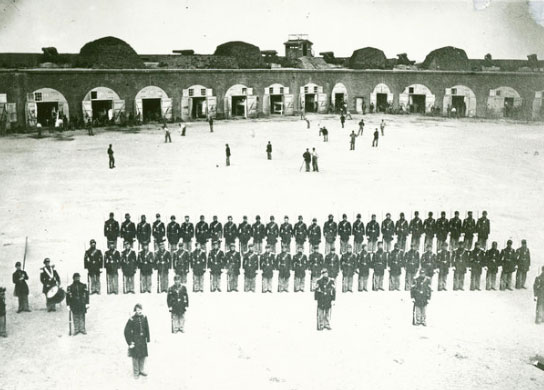The National Pastime, Amid a National Crisis

An early version of a baseball game took place in the background as members of the 48th New York State Volunteer Infantry lined up in Fort Pulaski, Ga., in 1862. Western Reserve Historical Society
This is one of the earliest photographs ever taken of a baseball game, and it happened by accident. The photographer, Henry P. Moore, of Concord, N.H., was focusing on the well-uniformed Union soldiers of the 48th New York State Volunteer Infantry, but he also captured their baseball-playing comrades in the background.
The “hurler” (as pitchers were called), wearing a white shirt, is tossing underhand (by the rules of the day) to a “striker” (batter), with bent knee. At the time, baseball had yet to achieve anything like the level of importance it later attained; for Moore, it was just something that got into your picture frame when you were trying to photograph soldiers on display.
It was the second year of the Civil War, and the scene was Fort Pulaski, Ga., which stood on an island at the mouth of the Savannah River. After falling to the Confederacy in 1861, the fortress had been bombarded for 30 hours and seized back in April 1862, preventing the rebels from using the vital port of Savannah. Like an increasing number of both rebel and Union soldiers, Pulaski’s warriors were encouraged to divert themselves from time to time by turning to baseball.
By combining the Civil War and baseball, Moore’s photograph merges two of the most important elements of the American historical experience, both of which, to this day, have deep emotional resonance. Baseball did not became the “national pastime” until long after Appomattox, but Americans came to feel so passionately about the game that some mythmakers tried to embellish the historical record by exaggerating its importance during the time the Union fought the South….